- Home
- BobA. Troutt
A Cry in the Wind Page 4
A Cry in the Wind Read online
Page 4
*****
A Cry in the Wind
Blackberry
The sun set quickly around the little community of Slick Rock, Alabama on evening in 1952. Since early evening, the search party had been looking for Elizabeth Miller. She had left early that morning to pick blackberries, and had never come home.
“It isn’t like her,” her mother stated. “Usually, she is only gone for a couple of hours.”
The thought of something terrible happening to her lingered in the minds of the search party; two other children were missing already and they had not been found. Walter Holmes, the town sheriff, yelled for me and the other men to bring flashlights and Joe Frank’s hounds.
“It looks like fog is trying to set in,” said Walter. “We need to stay ahead of it.”
“Yes, sir,” I replied.
Walter is my uncle. My name is Chad. I had been on the force for about six months, and the job seemed unbelievable. The state police have been called in to help with the searches. The FBI arrived this afternoon to lead the investigations. The terrain is very rough. There are miles of hills and hollows, thick woods and underbrush.
Frantically, Elizabeth’s mother broke through the barrier screaming, “Walter, Walter, you have to find my little girl!”
He carefully took her into his arms and held her for a moment. “I’ll do my best, Corina Jean,” he replied. “I promise.”
Walter motioned for two of the deputies to take her away. They took her; she sat down by the ambulance. Daylight was disappearing fast as the darkness of night began to move in.
Warren Daniels, the FBI agent in charge of the investigation, spoke up. “I want everybody to listen and listen well. “Time is of the utmost importance. I want you to spread out arm length, stay together, and move very carefully and slowly. We want to comb the whole area on this side of the road as well as we did the other side. Sweep it clean, men. Let’s go. Sheriff Walter, move the dogs around in front of us and let them go.”
“Yes, sir,” he replied.
Joe Frank took some of Elizabeth’s clothing so the dogs could get a scent. Then he let them go. The sound of the hounds gave a haunting feeling as the edge of night hung in the Alabama sky. The intense search for Elizabeth continued as the fog continued to move in. In the distance you could hear the hounds barking. The fog hovered close to the ground, and in no time it circled the woods, making it almost impossible to see. Suddenly, there came a cry in the fog.
“We found something!” cried one of the men.
Approaching the man, we found a body lying in a shallow grave partially covered with leaves and brush. From the looks of the decomposed body, it wasn’t Elizabeth, but possibly one of the other missing victims. About a hundred feet more, the hounds had found something else. We raced to the scene; I had a bad feeling about it, and I was right. It was Elizabeth’s body, also buried in a shallow grave. She was only twelve years old.
We carefully roped off the area, trying not to disturb the crime scene. It was very difficult with the fog hovering around us. But as morning started to break, the fog broke up and dwindled away. By sunrise the FBI crime team was set up and operational.
In the chill of the early morning a voice called, “Warren.”
He hurried to the sound of the cry and another body had been found buried under the first victim we had found.
“Well, this takes care of all the missing victims. The other two victims were ten and eleven,” said Walter.
“Yes, it appears so,” replied Warren. “We have three bodies and no suspect. Okay, men, I want you to search out beyond the perimeter to see what else we can find. Walter, can we get the dogs back out there?”
“Sure,” he replied. Then he hollered for Joe Frank.
The crime team continued investigating until the next morning. According to the report all three victims appeared to have been tortured and murdered in the same way, a few days apart. The mutilation of the faces appeared to have been done after they died. All three victims had been raped and sodomized. Some type of hair fibers were found on each of the children’s clothing. They were going to be sent to Birmingham for more testing. Within hours they finished processing the crime scene.
Carefully, the bodies were carried out of the woods to the command post near the road. Elizabeth’s mother lay asleep as Walter approached her. Startled, she awoke and immediately sensed that something was wrong. When she saw him and then the bodies, she went to pieces. She started screaming and crying. Her body shook. She cried out her babies names and then fell to the ground screaming, “Oh, my God, why?”
It was all Walter and I could do to hold her back. Walter was unable to calm her, so he had her transported to the hospital. On the way to the hospital, she finally stopped crying and screaming, and just stared out into space.
The volunteers who helped with the search headed for home. It had been a long, bad night and morning. Once we got back to town, we took a short break. The coffee sure did hit the spot, but a nap would have been better. Most everyone had gone home to get some sleep, leaving a skeleton crew behind. I stayed because I wanted to find out more.
The other two bodies were the victims missing from around the Tuscaloosa area. They had been missing at least two weeks. The victims’ right eyes had been plucked out, the right ears had been slivered off, and their tongues had been removed. Elizabeth, the most recent victim, suffered the same mutilation. That told me the killer was trying to tell us something, but I didn’t know what. It was pretty obvious that he was implying see no evil, hear no evil, and speak no evil. But what was the connection? Was it religious or cult related?
Warren stated, “A lot of the time this is a standard warning from the killer. I have seen this in similar cases. Every killer has his own personal calling card. In some cases it’s a huge difference, but in others it may only be a slight difference and is often overlooked. In this case, there appears to be a lot of pain, rage, hurt, and anger in this killer. See how mutilated the cuts are to the face, such as an animal. This is the key to his killing. It’s not for show or a vanity killing. This killer is driven by rage. Notice the uneven zigzagged cuts of the knife and the torn flesh. It’s probably safe to say that the killer has been a victim of abuse or a violent crime. Gentlemen,” he warned, “we have a serial killer on our hands that stalks and preys on little children. We have to find and stop him before there are other victims.”
The killings stopped for the next few weeks, until a report of a victim turned up in Hanging Limb, Mississippi. It was reportedly the same M.O., and this victim had been picking blackberries just like the other victims. The abduction in Hanging Limb was not far from the Alabama state line. Slick Rock was about thirty miles south of Hanging Limb. Both were rural areas, sparsely populated with farmland and houses.
Warren, Walter, and I drove over to Hanging Limb that evening to examine the evidence. It took us a few hours to get there. The word that there had been a body found across the state line traveled faster. When we arrived on the scene, the M.O. was identical; even the hair like fibers were present. The Birmingham and Jackson offices agreed to work together on the cases, so we headed back to Slick Rock.
The investigation of the murders quickly spread across the two states. Hundreds of people were questioned. Families and friends pulled together to help. A state warning was issued across both states: DO NOT PICK BLACKBERRIES. DO NOT TRAVEL INTO THE WOODS ALONE...
“I have never seen anything like this,” I said to Walter and Agent Warren.
“Warren?” asked Walter. “Have you ever worked a case like this before?”
“No, I haven’t,” replied Walter. “It’s always been a quiet community with routine problems, but nothing out of the ordinary. There was something strange that happened several years ago, though. It was an isolated incident in the summer of 1943. A thirteen or fourteen-year-old boy was found in the woods beaten half
to death. Some coon hunter found him molested and raped. If I remember correctly, he was a little slow, retarded I guess you would say.”
“What happened to him?” questioned Warren.
“I believe he was placed in the Taylor Valley Mental Health Hospital,” replied Walter. “The judge really didn’t know what to do. The boy was not from around here. Some believed he was a runaway or just passing through. He had no folks to turn to.”
“Do you think we can find him?” asked Warren. “Can we get his name?”
“I don’t know,” answered Walter. “A few years ago a fire broke out in the courthouse and destroyed nearly all the files.”
“What about the hospital in Montgomery?” Warren asked. “Do you think there is any way to find his records?”
“That’s another problem,” stated Walter. “They closed and condemned the hospital in Montgomery. The remaining patients were moved to the state facility in Birmingham. I have no idea if he is there or even still living.”
“Surely all the patients’ records were kept,” said Warren. “I would think they have to.”
“I would say the records are probably kept in Birmingham,” replied Walter.
“Did they ever find out who did that to the boy?” inquired Warren.
“That whole case was strange,” explained Walter. “There were no witnesses and no apparent M.O. The boy was just a random victim; a victim of a sick individual. Some believe the attacker was a loner, a hitch-hiker passing through. It never went to court. His appointed lawyer plea-bargained for him to stay in the hospital until he was twenty-one instead of the rest of his life.”
“How old would he be now?” asked Warren.
“Around twenty-three,” replied Walter.
“There was not much of an investigation at the time. It was one of those hush-hush crimes. Nobody talked about it openly, they talked among themselves. I worked on it until it became a cold case. Hey, Warren, if I’m not mistaken, the little boy was also picking blackberries when he was attacked.”
“There has to be a connection,” said Warren. “It’s time to take a little detour to Birmingham. What do you think, Walter?” asked Warren.
“I believe you’re right,” said Walter.
“Count me in,” I replied.
“Your nephew is going to make a fine police officer one of these days,” bragged Warren. “He reminds me of myself when I first broke into law enforcement.”
Everything died down in Slick Rock for a while. We made it to Birmingham. Most of the records from Montgomery were in the basement of the hospital. It was like trying to find a needle in a haystack. There were files dating back to the late 1800’s. Even though we didn’t know what we were looking for, we spent hours on top of hours looking and searching for something to give us a lead. There were damaged files, charred from the smoke. The scorched papers and water-stained files had been sent from the courthouse at Slick Rock for the patients who had been transferred there by the court.
While there, I received the report on the hair-like fibers. The tests showed that they weren’t human or animal hairs, but synthetic fibers used to make wigs. The fake hair was also used on a lucky rabbit’s foot toy that children play with.
Suddenly, Warren cried out, “What about this?”
It was titled ‘Patient Name Unknown 1943—File #4684-07-A’. Warren carefully opened the file, what was left of it. The patient was a fourteen-year-old male born in 1930. His history, background, and relatives were all unknown. The doctor’s evaluation recorded him entering the hospital in 1943. He had been badly beaten, and sexually assaulted.
“That’s our guy!” shouted Walter. “What else does it say?”
He was mentally retarded and suffered from a personality disorder. He was intelligent but not socially or emotionally mature. He had limited speech for some reason. The patient’s name was Willie Ray Key. He was to be released on his twenty-first birthday by the courts.
“That’s him,” said Walter.
Found on him was a photograph of an unknown girl. A connection was never made with the girl. The report was signed by Dr. Jearaldean Gilmore, M.D., PhD.
“I wonder if this Dr. Gilmore is still with the hospital.”
“I don’t know,” stated Walter, “maybe.”
“Let’s see,” I replied.
We spent the night in Birmingham. Early the next morning, we went back to the hospital to see Dr. Gilmore. Luckily, she still worked there. Matter of fact, she was the director of the psychiatric ward. We asked to see her and fortunately she was available. We questioned her about the patient in question. But she didn’t have too much more to add, only the fact that when Willie turned twenty-one he appeared to be in a lot better health. They felt he could survive in the world and take care of himself.
“Do you think he was a danger to himself or others?” Warren asked.
“I don’t really know,” she said. “I’m not sure. A lot of the anger and violent rages he exhibited had gone away. It had been several years since we saw anything like that out of him. We would have gone back to petition the courts and kept him here if we felt he would hurt himself or others. The last three or four years, he was a model patient. The therapy and shock treatments seemed to have worked wonders on him”
“What about the picture?” Walter asked. “Who is the girl? Do you have any idea?”
“I don’t know,” she replied. “It could have been a sister, friend, or a total stranger. He could have gotten it out of the trash and stuck it in his pocket. He may not know himself. But there is one thing I do know, he held onto it with his life. I almost never got a copy of it for my files. The hospital tried to find out who she was, but couldn’t. Well, gentlemen, I don’t know if I have been much help, but I have a meeting to attend. So, if you’ll excuse me.”
“Thank you for your time,” said Warren as he stood and shook her hand.
“Thank you,” replied Walter as he nodded his head.
“Oh, yes, there is one more thing I forgot,” she said. “Willie always kept a rabbit’s foot attached to his belt loop. It was his lucky charm. He always rubbed it for luck. Good day, gentlemen.”
The drive back home was an interesting one. All three of our heads were working together, putting together the pieces of the case. This Willie Ray seemed more and more like our killer. But we had no idea where he was or how we would find him.
I thought to myself, “It will never be the same in Cobb County.”
“I believe,” stated Warren, “if we can find the girl in the picture we may be able to locate him. He may be with her. What do you think?”
“Well, she is our strongest lead alright,” agreed Walter. “She would be easier to trace down. We have her description. I say go for it.”
“What about you, Chad?” asked Warren.
“I believe it is the best route to our killer,” I replied.
“When we get back to Slick Rock, we’ll make copies of the picture, post them around, and go door to door. We’ll put one in every patrol car across the two states and see what happens,” said Warren.
“That should turn something up,” I shouted.
From that point on, an intense search to find the girl in the picture was underway. Days and weeks went by, roadblocks were set up, and everything that could be done to find her was done. It had been almost two months when we finally got a lead. A call came into the station from Broken Limb, Mississippi from a possible cousin of the girl. Warren, Walter and I left Slick Rock in a hurry, headed for Broken Limb.
“Maybe this is the break we’re looking for,” I said as Warren and Walter agreed. “I hope and pray.”
It wasn’t too long before we arrived at the address the caller gave us. We were met by a woman holding a photo album. As we eased up on the porch and sat down, she showed us the pictures. It appeared to be her.
“Her name is Betty Mosley,” said the woman. “
She grew up around here and lived about a mile down the road. She lived with her mother until her mother got sick and then she moved in with her aunt. It was 1943 I’m sure because her mother died with cancer that winter. She was around eleven-years-old, I believe. It was 1943 when that unnamed little boy was attacked and sent to the hospital.”
“Isn’t that strange,” replied Walter.
“Do you know where we can find her?” asked Warren.
“It’s been about five or six years since I saw her,” said the woman. “But I’d say she is still at her aunt’s house. Her aunt used to live over in Walnut Shade which is twenty miles south of here.”
She gave us an old picture of their house.
“Thank you, ma’am,” said Warren. “You have been a big help.”
“I hope you can find her,” she said as we drove away.
“What do you think, Walter?” asked Warren.
“I don’t know, but it seems like it’s coming together,” he replied.
“If she moved about the same time as Willie’s attack, there is a possibility she may have witnessed something.
You’re right,” agreed Walter. “These killings may be revenge murders or his way of calling out for help,” explained Walter.
I sat and listened as the case began to come together. Something devastating happened in 1943 and it had two states in an unbelievable manhunt. The drive seemed endless. I didn’t think we would ever get there until we finally arrived. The house looked like the one in the photograph, only older. As we approached, it looked like no one was at home. All the lights were out, the windows were covered, and you could probably hear a pin drop in the dust. We got out of the car, not knowing what to expect. The fear that Willie Ray might be hanging around began to stir within me. As we eased up toward the porch, we spotted a girl sitting on the porch. It looked like her. Shockingly, from around the corner came a woman’s voice.
“What the hell is going on around here? Who the hell are you?” she cried.
Warren quickly showed her his badge and began to explain things to her.
“Well, I don’t think Betty can help you,” the woman said. “She’s been like that since her mother died. She went to bed one night and woke up screaming. She hasn’t spoken a word since. She just sits and stares. She has bad dreams nearly every night. The doctors examined her and say she is in a catatonic state, probably caused by having to give up her mother and all. They were real close.”
“May I ask a few questions?” said Warren.
“Ask all you want,” she replied. “I don’t know if I can help you or not.”
“Around 1943, did Betty live with her mother in Broken Limb?” asked Warren.
“Yes, she did,” answered the woman. “That’s when her mother got sick.”
“Do you recall a fourteen-year-old boy around that time that may have been friends with Betty?” he asked.
“Could have been, I don’t know,” she said. “That was a long time ago. Betty was sort of a backwards and bashful child. It was hard for her to meet other children. The Betty I knew then, I’d have to say, I doubt it.”
“Well, thank you for your time,” stated Warren. “If anything changes, please call me at this number,” he said as he handed her his card.
We headed home. It looked like we had run into another dead end.
“I believe this girl has the key to this case,” said Walter. “Did you see her eyes when you mentioned about the fourteen-year-old boy?”
“No, I missed that,” said Warren.
“There was something there,” replied Walter.
We didn’t have too much to say on the way home. Walter and I lay back and dozed off.
Two weeks after we visited Betty Mosley, the killer struck again. There was a victim in Mississippi and another one in Alabama with the same M.O. and shallow graves. The case had become frustrating. Warren, Walter, and the others were beaten down in discouragement. How many more victims would have to die before there was a solid lead in the case?
Out of the blue, a call came in of a strange man running into the woods up around Brinkley’s Branch. We quickly took off. Walter called Joe Frank and told him to meet us there with the dogs.
“Hold on, Chad,” shouted Warren as we drove off.
“You got it, Warren. Give it all you have!” I cried.
Every siren in Slick Rock was screaming.
“What do you think, Walter?” asked Warren.
“I don’t know,” he replied. “It could be a homeless person, but it’s worth checking out.”
The dust from the old country roads lay in rolls on top of the car; the smell and taste of it came in around the doors as we raced down the road. Unpredictably, the bottom fell out; it started raining.
“This is just great,” shouted Warren. “What next?”
“Maybe it will let up in a few minutes,” said Walter. “Thunderstorms are pretty common around here this time of year.”
“I hope so,” replied Warren.
When we arrived, we sat in the car waiting for the rain to stop and the others to arrive. Shortly, Joe Frank pulled in with two of his hounds up front with him and the rest on the back of the truck. He rolled down his window and yelled, “What do you think?”
“Let’s wait and see what happens with the rain,” replied Walter.
Joe Frank yelled back over the thunder, “Walter, I don’t think the dogs will do you much good now.”
“Let’s wait and see, Joe,” responded Walter.
As the rain beat down, the dust that had flown high in the air now lay as mud. The earthy smell of dust, as the rain fell, lingered about us as we waited.
“I want to beat the night,” said Warren. “If we don’t go in now, it’s going to be like looking for a needle in a haystack.”
“Well, the rain started to slow to a drizzle,” replied Walter. “What do you think, Chad?”
“It looks pretty good to me,” I encouraged. “We don’t have much of a choice.”
As we got out and stood in the rain, Warren briefed us before we headed into the woods. The thunder and lightning was bad. The worst I had ever seen.
“What about the dogs, Warren?” asked Walter.
“Let’s try them,” he insisted, “since they’re already here.”
Joe Frank quickly unloaded the hounds and they took off in pursuit. Little did we know the sounds of the dogs would haunt us from that time on.
I noticed the dark clouds above were quickly moving in and pushing out the daylight. Between the howling of the hounds and the thunder and lightning, there was no worry of anyone falling asleep. We pressed deep into the woods for hours, but didn’t find anyone. Night lurked about us as a slight rain continued to fall. The search team looked like a bunch of lightning bugs moving about in the darkness of night. Without warning came the cry of the hounds.
“They have found something,” shouted Joe Frank.
We hurried to the cry with our hearts racing as we dodged limbs, branches, thorns, and briars. When we reached the dogs they were zeroed in on one particular area. They had picked up a scent. The heavy rain fell on and off beating down as the thunder roared and the lightning streaked the sky. There before us stood an old abandoned house.
“Spread out,” instructed Warren, “and be careful.”
There was no light, only the reflection of the lightning when it struck. Carefully, we crept up to the house with our guns pulled. We eased up on the porch, and Warren proceeded to the door. I helped cover him. As Warren slowly turned the doorknob to open the door, Joe Frank noticed one of the dogs scratching beside the house.
“Walter he has something,” whispered Joe Frank.
Walter whispered to Warren and pointed toward the dog. Quietly, they backed off the porch and disappeared around the side of the house. The dogs had found a pile of brush covering a cellar door. Cautiously, the men circled around as they prepared to open it. The t
hunder bombarded the sky as the lightning tore into the darkness. There was something here. The men stood with their guns pointed at the cellar door. Warren carefully opened it and peeped inside. Quickly, he slung it open. There before him was a man shaking and trembling as he huddled in the corner. He was scared to death. Warren heard muffled noises coming from behind the man. As he got closer to him, he found two children bound and gagged. They appeared to be alright, just frightened. As we reached for the man, he backed away from us. After several minutes, we finally got him out of the cellar. When the sky opened with shattering thunder, lightning struck a nearby tree. The man went to pieces, broke loose, and took off running and screaming. It took four men to catch and hold him down.
“He’s afraid of the storm,” said Walter. “He’s terrified. He must have been marked.”
“Marked,” I replied. “What do you mean, Walter?”
“Before he was born, his mother must have been scared by lightning. She may have seen someone struck or was possibly struck herself, causing him to have a phobia of storms,” explained Walter.
“I believe we have found Willie Ray,” stated Warren.
“I agree,” replied Walter. “I guess this is where we go our separate ways, Warren. You got your killer and I have a town to take care of.”
“It’s been good working with you, Walter,” said Warren. “I’ll keep in touch.”
The long search had finally come to an end, but not without the cost of several innocent lives. On the way back home, the relief of the nightmare was a sweet peace.
When Warren got back to the station he placed Willie’s belongings in a plastic bag. There was a hawk bill pocket knife, some change, a rabbit’s foot dangling from his belt loop, and a picture of the girl, Betty, in his shirt pocket. He continued to follow the case and kept Walter informed.
The children we found in the storm cellar were hospitalized for a few days. Their parents were notified and counseling was arranged for both the children and their parents.
Willie was interrogated for several hours and then placed in a padded cell. The wheels were finally in motion. He received a court appointed attorney. During his arraignment he was bound over to the grand jury with no bond. A court date would be set if he was found capable of standing trial. If guilty, he would likely receive the death penalty. Doctors were called in to do a two week psychological evaluation. Two weeks later the doctors presented their conclusion to the judge. The findings were conclusive. He was retarded, incoherent, confused, had slurred speech, and memory loss. Willie was not capable of standing trial.
“No surprise,” I thought.
The judge petitioned the courts to offer a short hearing, pending the situation of the past and present circumstances of it being a cold case. The attorneys would present their evidence and witnesses at that time to help shed a little more light on the case, whether good or bad. But, in respect of the courts, this would be nothing more than a hearing, not a trial. Judgment of sentencing would be made afterward, which I thought was a little out of the ordinary, but a nice thing to do. The hearing proceeded on time.
“Hear ye, hear ye, all rise, Judge Robert M. Mooneyhand presiding. The Commonwealth State of Alabama vs. Willie Ray Key Docket #347962-30-1 is now in session. You may be seated.”
The first day of the hearing, the state presented their case. Their strongest point was the mental evidence they had against him. They had no strong motive, only the psychological condition of the defendant at the time of the crimes. The defense moved that the client had been wrongfully done early in life; justice had not prevailed. No argument could justify his actions or the loss of lives. But it would be taken into consideration at his sentencing. The court dismissed until the next day.
On the second day the state called their first witness, Dr. Jearaldean Gilmore of the Psychiatric Ward at Birmingham Mental Health Facility. Her testimony, along with the interview with FBI Agent Warren Daniels, supported the state’s case, but at the same time supported the possibility of him being the victim of a violent crime. She said, as a professional in her field, that Willie had made tremendous improvement. With the therapy and shock treatment he appeared capable of handling society.
“I don’t know what happened to him after he was released, but something must have triggered a relapse and brought back the driving rage.”
“I have a question,” said Charles C. Browning, the defense attorney. “I respect your professional opinion,” he said, “but this is only a hearing. Off the record, in your personal opinion, is what happened to him in the woods when he was young possibly the cause of all this?”
Doctor Gilmore sat a few minutes then stated, “Willie was born backwards, plus he was brutally beaten and left for dead. Yes, I believe it could have played a role in the outcome of it all.”
“Thank you, Dr. Gilmore,” he said.
“Does the state have any questions for the witness at this time?”
“Yes, your honor, I have a quick one. Dr. Gilmore, during Willie’s stay at the hospital,” asked the District Attorney, “did he ever mention or remember the person or persons who beat him in the woods that day.”
“No,” she replied.
About that time, the courtroom door opened and in walked Betty Mosley, her aunt, and Agent Warren Daniels. Willie Ray immediately looked around. He seemed to recognize her, but he didn’t seem sure. He reached for his shirt pocket but it was empty. She waved and smiled at him from across the room. He quickly jumped up, scooting the table forward as he waved back. The court officers ran over to him and placed him back in his seat. The judge slammed the gavel down on the desk and called for a fifteen minute recess. Judge Mooneyhand left the courtroom and headed for his chambers, followed by Attorney Browning. When they reached the judge’s chambers, Browning started questioning the judge.
“What’s going on, Robert? Who is that girl?” asked Attorney Browning.
“I don’t know,” replied the judge. “I’m just as surprised as you.”
“She seemed to know Willie Ray,” responded Mr. Browning, “and he knew her.”
The D.A. walked in Judge Mooneyhand’s chambers and asked, “What’s going on? Who is the girl who just entered the courtroom?”
“That’s the only eyewitness in this case,” boasted the D.A.
“Eyewitness!” cried Browning.
“What are you talking about?” asked the judge.
“She was there. She saw what happened to Willie Ray in the woods when he was fourteen years old. Why, is there something wrong?” he questioned them.
“No, everything is fine,” they both responded.
“Where did they find her?” asked Browning.
“Agent Daniels found her,” said the D.A. “I can put her on the stand, can’t I, your honor?”
“Sure, that will be fine,” replied Judge Mooneyhand.
Within a few minutes, they reentered the courtroom. The district attorney’s opening remarks stated that after all this time, since 1943, they were able to present an eyewitness of the murder of the children and what happened to Willie Ray.
“We call Betty Mosley to the stand,” he stated.
As the bailiff swore her in, Willie Ray watched in amazement and tried to wave at her when he could. I was so proud of Betty; she was a very brave woman.
The district attorney asked, “How old were you at the time when you witnessed Willie’s attack?”
She replied, “Eleven years old.”
“And how old are you now?” he asked.
“Twenty-five,” she answered.
“So Willie was around thirteen or fourteen years old,” he said.
To help clarify things, the district attorney informed the court that the reason Betty had not come forth earlier was that she had been in a catatonic state since 1943 until two weeks ago. She was from Mississippi and lived with her aunt where she had little to no knowledge of the incident in question. Not o
nly being catatonic, but the case in question was kept quiet—a hush-hush crime.
“Now, Betty, I want you to take your time. Start from the beginning and tell me what you saw and remember from that summer in 1943. Don’t be afraid.”
“I first met Timmy, you call him Willie, in the woods by chance one day. We were picking blackberries. I lived across the woods in Mississippi, just over the state line. Timmy and I met in the woods a few times and played. He couldn’t talk plain and acted sort of funny, but we still played together. Then one day we were going through the woods picking berries. I told Timmy to go on ahead of me and I would come around on the hillside and meet him next to the gulley at the creek by the blackberry patches. When I left, Timmy was already out of my sight. I followed the hill on around to the blackberry patch. I heard something strange and stopped immediately. I then ran and hid behind a pile of dirt, peeping out from behind it every chance I got.”
“Tell us, Betty, what you saw and what happened next,” said the D.A.
She started to cry because she didn’t want to remember.
“Don’t be afraid, Betty,” he said. “No one is going to hurt you.”
Willie Ray was getting uneasy as he listened to her testimony.
“I saw two older boys, naked, having sex on the ground,” she mumbled.
The courtroom fell silent as she went on.
“They were probably around twenty-one years old,” she stated.
“What about Timmy?” he asked.
“Timmy didn’t see them at first, but as he came around the patch, they saw him. I had no way of warning him. I was so scared myself. He took off running and they ran after him. He didn’t get far before they caught him and brought him back to the patch. I watched as they tried to figure out what to do. They started beating him. One of them held him down and the other one raped him. Then they changed up. He fought and struggled to get away but they were too strong for him. I don’t know much after that. I was in shock and afraid they would get me. The boys put on their clothes, pitched Timmy into the patch of blackberries, and left.”
“Did you recognize these people?” he questioned.
“No, sir,” she said. “I had never seen them before. I still have them blocked out of my mind.”
“I understand, Betty. Then what?” he asked.
“I went to see if I could help Timmy. He was all bloody, cut, and bruised. His eyes were nearly swollen shut. He lay there motionless; I thought he was dead. I took out running for home. I guess I had blocked it out of my head for a while until the dreams started.”
“Why didn’t you tell someone?” asked the D. A.
“I was so terrified,” she said. “I watched over my shoulder every minute of the day, afraid they might have seen me and come after me.”
The courtroom was dumbfounded. The judge asked for a recess until tomorrow morning at ten o’clock when he would announce his decision. Court was dismissed.
That night seemed like the longest night in Alabama history. The town pondered over the story of Willie. They couldn’t believe it could ever happen in Slick Rock. Morning didn’t wait for anyone, as the darkness of night became the breaking of day.
Everyone hurried over to the courthouse to get a seat. Judge Mooneyhand entered the courtroom looking very worried and puzzled. He looked like he hadn’t slept. As they brought Willie Ray in, his attorney, Browning, hung his head down. As the ladies and gentlemen in the courtroom held their breath and waited, Judge Mooneyhand began to speak.
“I have never in the history on the bench seen a case like this one in my life. On one hand an innocent victim of one crime and a deadly killer on the other hand. Incompetent to stand trial, but yet a killer you feel compassion for. Willie Ray, please stand. By the authority of the state of Alabama, I sentence you to spend the rest of your natural life in the State Mental Institute at Birmingham. This cold case is closed,” shouted the judge. “Court is adjourned.”
The courtroom emptied and there were only two left, Judge Mooneyhand and Attorney Charles C. Browning who sat in silence.
“Do you think he recognized us?” asked Attorney Browning.
“I don’t know,” replied Judge Mooneyhand. “It’s been a long time, maybe not.”
“What about…?” asked Browning.
“Go on home, Charles,” suggested the judge, “and try to get some rest.”
Slowly, Charles began to stand as he broke down in tears.
“Let’s give it some time, Charles,” consoled the judge. “It has been several years.”
Six months later, Betty stopped by the state hospital to visit Willie. As she talked to him through a glass window, he smiled and listened. He reached into his pocket and pulled out her picture. They laughed; he was so glad to see her. When she started to leave, he showed her his rabbit’s foot, and Betty showed him hers.
“We are both lucky,” she said.
Tears began to flow from her eyes as she said goodbye. Unexpectedly, he spoke for the first time, “Betty, I know who they are.”

 Sycamore Tales
Sycamore Tales Jawbreakers, Bubble Gum and Stick Candy
Jawbreakers, Bubble Gum and Stick Candy Stepping Out on a Limb
Stepping Out on a Limb In the Light of Day
In the Light of Day Still Wind, Forgotten Days
Still Wind, Forgotten Days Turning Point
Turning Point Odds n Ends
Odds n Ends Giggle Book Three
Giggle Book Three Beyond The Truth
Beyond The Truth Troubled Waters
Troubled Waters Socks Without Matches
Socks Without Matches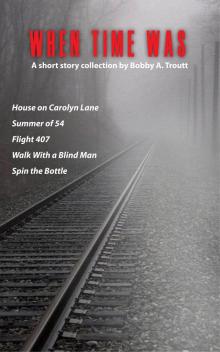 When Time Was
When Time Was Giggle's Holiday Book
Giggle's Holiday Book Giggle Book Two
Giggle Book Two Tickle Box
Tickle Box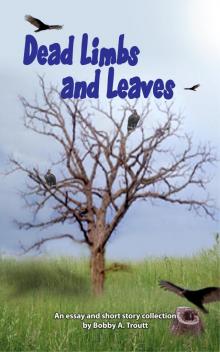 Dead Limbs and Leaves
Dead Limbs and Leaves Thistles and Thorns
Thistles and Thorns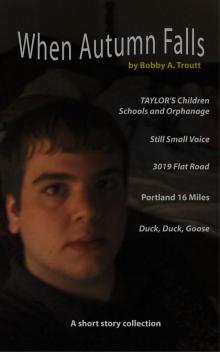 When Autumn Falls
When Autumn Falls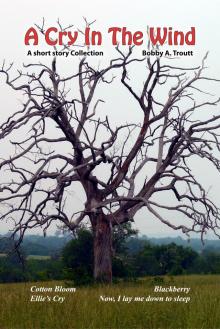 A Cry in the Wind
A Cry in the Wind Leftover from the Holidays
Leftover from the Holidays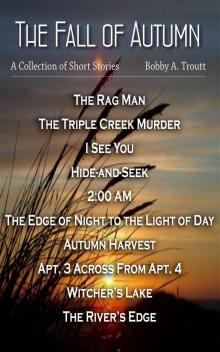 The Fall of Autumn
The Fall of Autumn The Fall of Night
The Fall of Night Giggle Book Four
Giggle Book Four